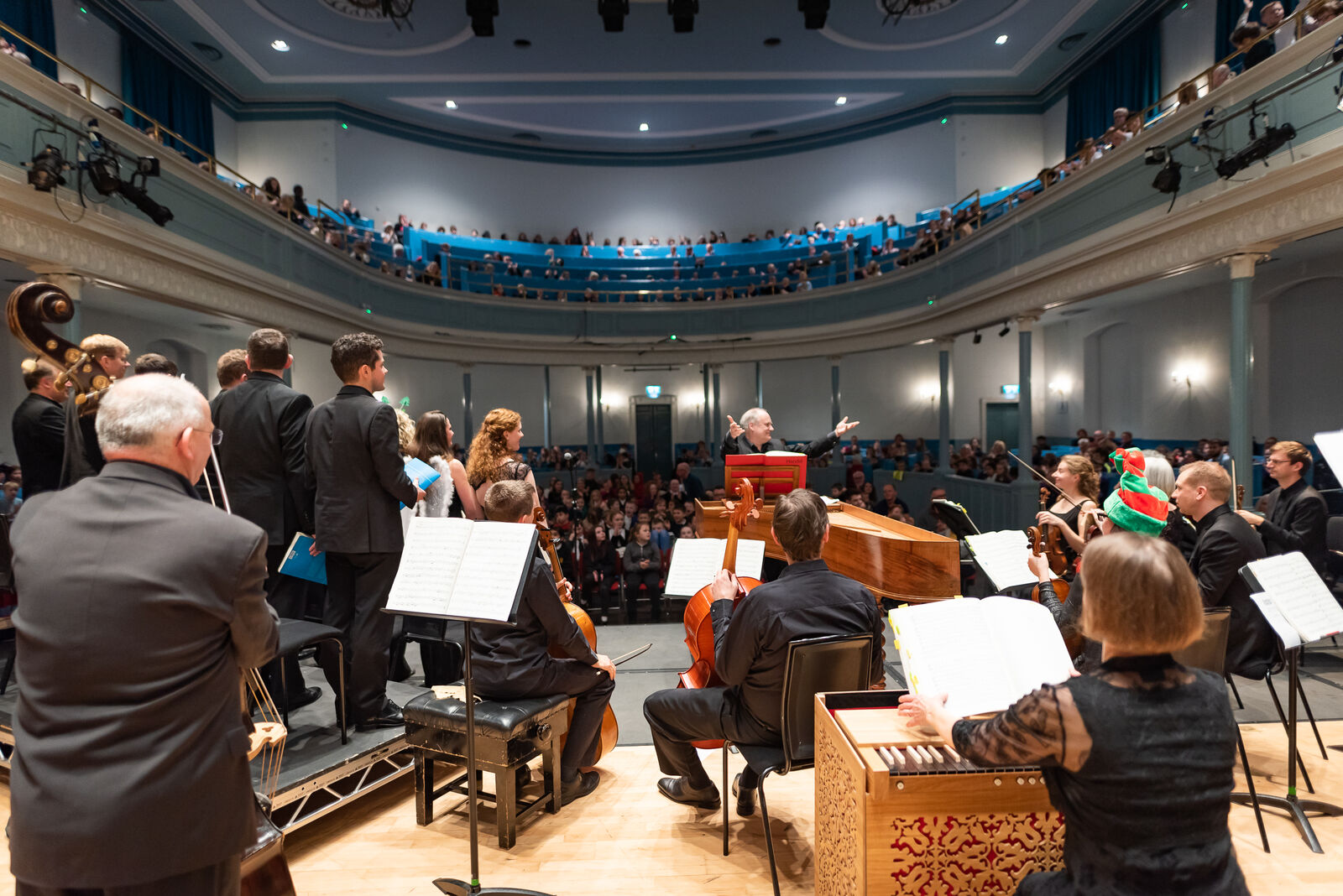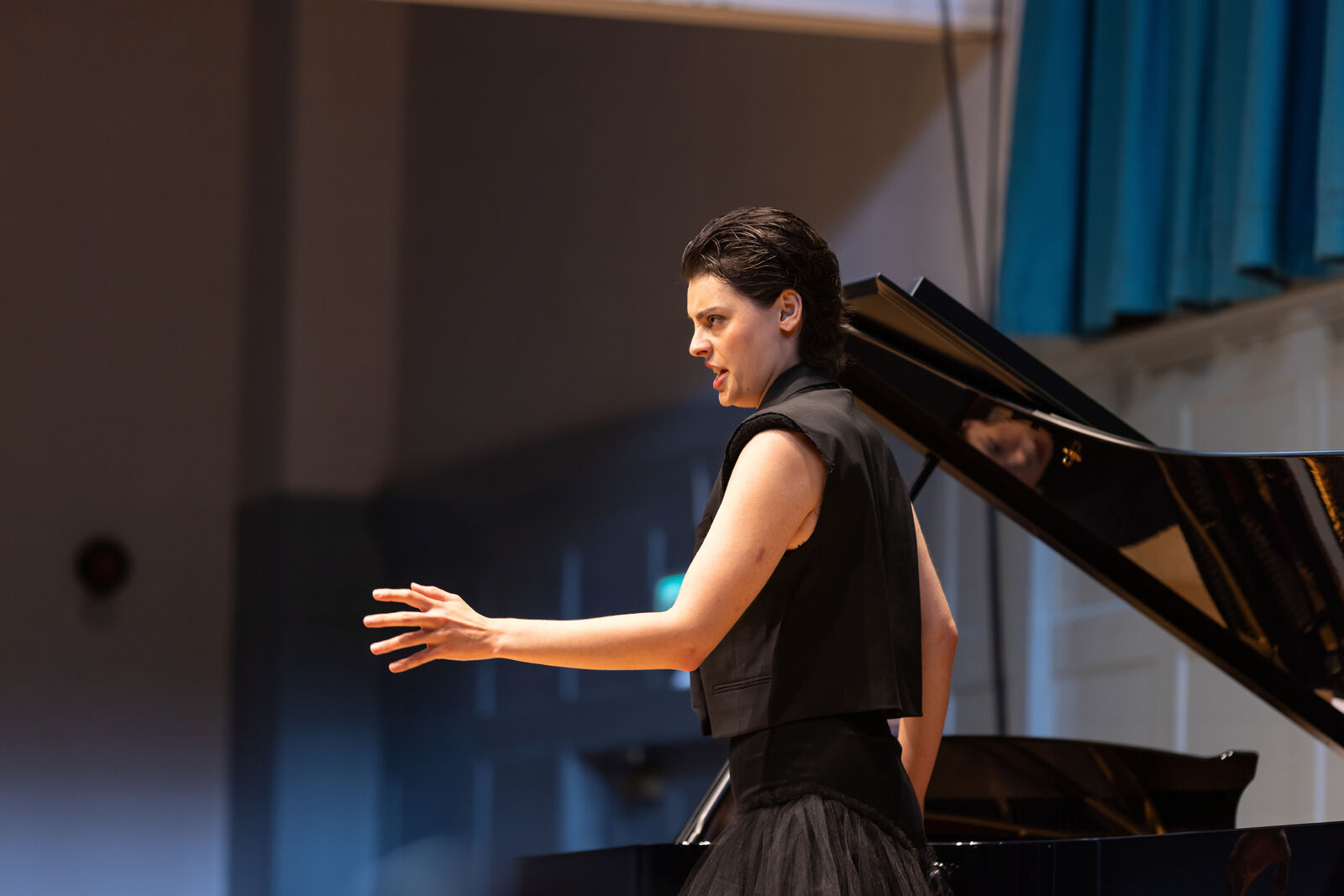Dunedin Consort, Butt / D’Angelo, Muñoz, Edinburgh International Festival 2025 review - tedious Handel, directionless song recital | reviews, news & interviews
Dunedin Consort, Butt / D’Angelo, Muñoz, Edinburgh International Festival 2025 review - tedious Handel, directionless song recital
Dunedin Consort, Butt / D’Angelo, Muñoz, Edinburgh International Festival 2025 review - tedious Handel, directionless song recital
Ho-hum 'comic' cantata, and a song recital needing more than a beautiful voice

Handel probably wrote his cantata Clori, Tirsi e Fileno in 1707 while he was in the service of the Marquis of Ruspoli in Rome. It tells the story of the shepherdess, Clori, who has two lovers that she plays off against one another to no great effect, everything culminating in an ending that’s suspiciously neat even by Handel’s standards.
The Dunedin Consort (pictured below by Andy Catlin with John Butt in an earlier concert) are the best conceivable advocates for it, with their silky strings and star soloists, particularly Matthew Truscott’s fiendish violin obbligato and Toby Carr’s beguiling theorbo, and I particularly enjoyed the purling pair of recorders in their two showpiece numbers.
In a piece for three high voices, variety is hard to come by, but they did their best in the choice of the three soloists. Julie Roset (Clori) had the lower, sultry soprano, while Nardus Williams (Tirsi) was more piercing and dramatic, with some fearsome coloratura in her Part Two aria. Reginald Mobley’s countertenor was more problematic, the voice seemingly caught between two registers and, therefore, wavering awkwardly between what sounded like a high tenor and a low countertenor.  John Butt’s indestructible life-force at the keyboard could make almost anything sound compelling, but even he struggled to energise a 75-minute long piece that isn’t exactly action-packed, and which unfolded at seemingly great length to little dramatic effect. They must have had a lot of time on their hands in the Ruspoli household. The Queen’s Hall audience had read in the programme that this was a comedy and therefore felt the need to laugh knowingly throughout, though I confess the jokes were lost on me, and several times I found myself checking the aria list to see how much longer we had to go. A special mention to Sascha Bota, viola player in the Consort, who was grinning from ear to ear throughout the piece, clearly having a marvellous time. I’m glad somebody was.
John Butt’s indestructible life-force at the keyboard could make almost anything sound compelling, but even he struggled to energise a 75-minute long piece that isn’t exactly action-packed, and which unfolded at seemingly great length to little dramatic effect. They must have had a lot of time on their hands in the Ruspoli household. The Queen’s Hall audience had read in the programme that this was a comedy and therefore felt the need to laugh knowingly throughout, though I confess the jokes were lost on me, and several times I found myself checking the aria list to see how much longer we had to go. A special mention to Sascha Bota, viola player in the Consort, who was grinning from ear to ear throughout the piece, clearly having a marvellous time. I’m glad somebody was.
I really wanted to enjoy the song recital the following morning from Emily D'Angelo (pictured below by Jess Shurte) and pianist Sophia Muñoz. D’Angelo is a rising star – she recently opened the Metropolitan Opera’s season in an opera that was written for her – and she has a really beautiful mezzo-soprano voice, dark and lustrous at the bottom with an exciting, blooming top. Her recital was at its best in the songs where she told a story, because she has a very fine dramatic instinct, and she knows how to use the voice in the service of that. There was a lovely, folksy touch of Americana to W.C. Handy’s "Morning Star", which was beguilingly soft, while Hugo Wolf’s "Feuerreiter" was grippingly told and sung. Muñoz understood well how to shade her accompaniment, with hymn-like calm in the Handy but vigorous athleticism in three songs by Bartók. Everything about this concert should have been magnificent.  Their programme was all over the place, however. It ranged from English folk song to whimsical Americana via Mahler, Bartók, Kodály and Zemlinsky. If there was a unifying theme or an overall conception to it then I confess it was lost on me, and the scattergun approach made the whole event feel pretty haphazard. The concert didn’t take us on any sort of journey that I could perceive, and it didn’t help that they totally upended the previously published programme, adding to the suspicion that it was all a bit random. Furthermore, in the new dispensation, nobody properly understood when to clap (for the simple reason that we hadn’t been told) which led to disruptive bursts of token applause appearing every so often. There was no sense of throughflow or organisation, which is all the more frustrating because it could all have been so easily fixed. When it comes to a song recital, a beautiful voice isn’t enough on its own.
Their programme was all over the place, however. It ranged from English folk song to whimsical Americana via Mahler, Bartók, Kodály and Zemlinsky. If there was a unifying theme or an overall conception to it then I confess it was lost on me, and the scattergun approach made the whole event feel pretty haphazard. The concert didn’t take us on any sort of journey that I could perceive, and it didn’t help that they totally upended the previously published programme, adding to the suspicion that it was all a bit random. Furthermore, in the new dispensation, nobody properly understood when to clap (for the simple reason that we hadn’t been told) which led to disruptive bursts of token applause appearing every so often. There was no sense of throughflow or organisation, which is all the more frustrating because it could all have been so easily fixed. When it comes to a song recital, a beautiful voice isn’t enough on its own.
rating
Explore topics
Share this article
The future of Arts Journalism
You can stop theartsdesk.com closing!
We urgently need financing to survive. Our fundraising drive has thus far raised £49,000 but we need to reach £100,000 or we will be forced to close. Please contribute here: https://gofund.me/c3f6033d
And if you can forward this information to anyone who might assist, we’d be grateful.

Subscribe to theartsdesk.com
Thank you for continuing to read our work on theartsdesk.com. For unlimited access to every article in its entirety, including our archive of more than 15,000 pieces, we're asking for £5 per month or £40 per year. We feel it's a very good deal, and hope you do too.
To take a subscription now simply click here.
And if you're looking for that extra gift for a friend or family member, why not treat them to a theartsdesk.com gift subscription?
more Classical music
 Dunedin Consort, Butt / D’Angelo, Muñoz, Edinburgh International Festival 2025 review - tedious Handel, directionless song recital
Ho-hum 'comic' cantata, and a song recital needing more than a beautiful voice
Dunedin Consort, Butt / D’Angelo, Muñoz, Edinburgh International Festival 2025 review - tedious Handel, directionless song recital
Ho-hum 'comic' cantata, and a song recital needing more than a beautiful voice
 Classical CDs: Dungeons, microtones and psychic distress
This year's big anniversary celebrated with a pair of boxes, plus clarinets, pianos and sacred music
Classical CDs: Dungeons, microtones and psychic distress
This year's big anniversary celebrated with a pair of boxes, plus clarinets, pianos and sacred music
 BBC Proms: Liu, Philharmonia, Rouvali review - fine-tuned Tchaikovsky epic
Sounds perfectly finessed in a colourful cornucopia
BBC Proms: Liu, Philharmonia, Rouvali review - fine-tuned Tchaikovsky epic
Sounds perfectly finessed in a colourful cornucopia
 BBC Proms: Suor Angelica, LSO, Pappano review - earthly passion, heavenly grief
A Sister to remember blesses Puccini's convent tragedy
BBC Proms: Suor Angelica, LSO, Pappano review - earthly passion, heavenly grief
A Sister to remember blesses Puccini's convent tragedy
 BBC Proms: A Mass of Life, BBCSO, Elder review - a subtle guide to Delius's Nietzschean masterpiece
Mark Elder held back from blasting the audience with a wall of sound
BBC Proms: A Mass of Life, BBCSO, Elder review - a subtle guide to Delius's Nietzschean masterpiece
Mark Elder held back from blasting the audience with a wall of sound
 BBC Proms: Le Concert Spirituel, Niquet review - super-sized polyphonic rarities
Monumental works don't quite make for monumental sounds in the Royal Albert Hall
BBC Proms: Le Concert Spirituel, Niquet review - super-sized polyphonic rarities
Monumental works don't quite make for monumental sounds in the Royal Albert Hall
 Frang, Romaniw, Liverman, LSO, Pappano, Edinburgh International Festival 2025 review - sunlight, salt spray, Sea Symphony
Full force of the midday sea in the Usher Hall, thanks to the best captain at the helm
Frang, Romaniw, Liverman, LSO, Pappano, Edinburgh International Festival 2025 review - sunlight, salt spray, Sea Symphony
Full force of the midday sea in the Usher Hall, thanks to the best captain at the helm
 Elschenbroich, Grynyuk / Fibonacci Quartet, Edinburgh International Festival 2025 review - mahogany Brahms and explosive Janáček
String partnerships demonstrate brilliant listening as well as first rate playing
Elschenbroich, Grynyuk / Fibonacci Quartet, Edinburgh International Festival 2025 review - mahogany Brahms and explosive Janáček
String partnerships demonstrate brilliant listening as well as first rate playing
 BBC Proms: Akhmetshina, LPO, Gardner review - liquid luxuries
First-class service on an ocean-going programme
BBC Proms: Akhmetshina, LPO, Gardner review - liquid luxuries
First-class service on an ocean-going programme
 Budapest Festival Orchestra, Iván Fischer, Edinburgh International Festival 2025 review - mania and menuets
The Hungarians bring dance music to Edinburgh, but Fischer’s pastiche falls flat
Budapest Festival Orchestra, Iván Fischer, Edinburgh International Festival 2025 review - mania and menuets
The Hungarians bring dance music to Edinburgh, but Fischer’s pastiche falls flat
 Classical CDs: Hamlet, harps and haiku
Epic romantic symphonies, unaccompanied choral music and a bold string quartet's response to rising sea levels
Classical CDs: Hamlet, harps and haiku
Epic romantic symphonies, unaccompanied choral music and a bold string quartet's response to rising sea levels

Add comment